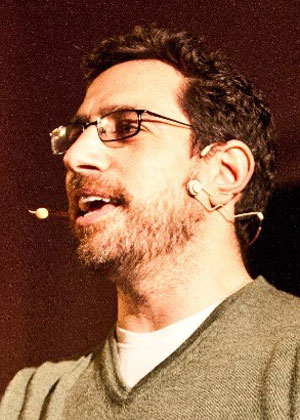At the top of Rabbi David A. Ingber’s information page of the Romemu website is a quote: “What we need is a living breathing Judaism, not an object of veneration kept in a locked box. We need a Judaism with calluses on its hands and dirt under its fingernails.”
Promoting “a renewed Jewish mysticism that integrates meditative mindfulness and physical awareness into mainstream, post-modern Judaism,” according to Romemu’s website, Ingber will serve as chaplain for Week Six at Chautauqua.

Ingber will preach at the 10:45 a.m. Sunday service of worship and sermon in the Amphitheater. He will also preach at the 9:15 a.m. morning ecumenical worship services Monday through Friday in the Amp. His sermon titles for the week include: “Mystery,” “Morning/Awakenings,” “Broken Tablet,” “Evening/Hour of Change,” and “Sabbaths.”
Ingber is the founder and senior rabbi at Romemu in New York City, a community he founded in 2008 that now includes over 700 households.
A disciple of Rabbi Zalman Schachter-Shalomi, founder of the Jewish Renewal movement, Ingber was ordained by Schachter-Shalomi in 2004.
On its website, Romemu describes itself as “a welcoming, experiential, irreverently pious Jewish community engaged in spiritual practice that connects the heart, mind, and body to foster human flourishing,” and seeks to expand spiritual engagement in Jewish religious practices.
“I dreamed of a place that felt warm, inviting, open, and alive,” Ingber wrote. “I envisioned a community that would be fully embodied, emotionally mature, and intellectually honest. I imagined worship services full of beautiful uplifting music, deeply relevant and meaningful messages, and restorative, silent meditation.”
Raised in New York City, Ingber grew up in the Modern Orthodox movement within Orthodox Judaism, which attempts to combine Jewish values and law with the contemporary and secular world.
He studied at several distinguished yeshivot in Jerusalem and New York, including Yeshiva University, Bais Medrash L’Torah, Yeshiva Rabbi Chaim Berlin and Yeshivat Chovevei Torah Rabbinical School.
He also studied philosophy, psychology and religion at New York University.
Ingber sees himself as a 21st-century Jewish thinker and educator, informed by his own curiosity and knowledge of a multiplicity of faiths in his approach to understanding the Torah, rabbinical teaching and ritualistic practice. Ingber is informed on both Jewish mysticism and teachings from the Hasidic movement of Chassidus, and combines these two branches of belief with ancient philosophies. Particularly influential have been the 18th-century Kabbalist and founder of Chassidus, Rabbi Yisrael Baal Shem Tov, the 19th-century Mordechai Yosef Leiner known as the Ishbitzer, and myriad 20th-century thinkers — from Kabbalist Abraham Isaac “Rav” Kook to Carl Jung.
Ingber was named one of 2013’s top 50 most influential rabbis in the United States by The Daily Beast and The Forward listed him on their Forward 50 list of American Jews.
Ingber serves on the faculty for the Wexner Heritage Program, Shalom Hartman Institute of North America and Israel, The 92nd Street Y’s program for Rabbinic Entrepreneurship and other institutions. He has been an American Jewish World Service Global Justice Fellow and a Rabbinic Fellow in the Shalom Hartman Institute’s Rabbinic Leadership Initiative.




